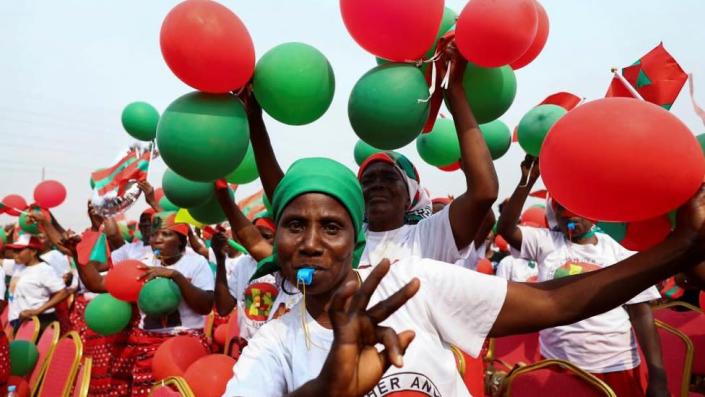
Angola’s election on Wednesday is expected to be the most closely fought since independence in 1975.
With the MPLA in charge for more than four decades, it might be hard to imagine that it could lose its place at the pinnacle of power.
But it is facing a growing wave of discontent fuelled by high levels of poverty and unemployment.
Despite Angola being rich in oil and minerals, many have not benefitted from that wealth.
And while the 20 years of peace after a protracted civil war have been welcome, they have not brought the gains that many hoped for.
There are eight parties taking part, but the MPLA’s main opponent is Unita – a one-time rebel movement.
It is seeking to capitalise on the unhappiness as the nearly 15 million registered voters pick their president and parliament for the next five years.
The large number of challengers to the MPLA could fracture the opposition vote, but this time Unita has formed an informal coalition with civil society groups and activists to broaden its appeal.
Voters will cast one ballot and the leader of the party with the most votes will become the president.
The capital, Luanda, is plastered with party propaganda. Large billboards with the faces of presidential candidates are scattered around the city, where on campaign days the streets have filled with music in an attempt to entice the voters.
The red, black and yellow of the MPLA dominates with its slogan “the strength of the people”. Unita’s red and green colours can also be seen in some parts of the city with posters proclaiming that “the time is now”.
Two faces stand out:
In the capital, there is also a strong presence of armed police and military personnel, which intensifies the feeling of tension ahead of what could be historic elections.


Some analysts are saying that people are starting to imagine a different party in power.
“The general sentiment is that the country is ready for things to change,” economist Âurea Mouzinho told the BBC.
“People are much more mature and less afraid that they want things to be different.”
The last time things were this close was in 1992 when the president at the time, José Eduardo Dos Santos, faced the leader of the Unita rebel group, Jonas Savimbi.
A dispute over the result led to resumption of the country’s long civil war.
But there is a difference this time.
“Thirty years later, we can say that we have citizens who are more active in the electoral process, analysing, criticising and denouncing acts they consider wrong,” Cesaltina Abreu, a researcher at the Catholic University of Angola said.
But the MPLA remains confident that it can still deliver for Angolans.
“We are convinced of a victory. Working on the ground and mobilising people, we talk to them and we measure what they are saying,” Arsénio Satyohamba, a youth leader from the MPLA running as an MP, told the BBC.
Despite coming to power in 2017 with promises to fight corruption both within his own party and the government as well as provide 500,000 jobs for young people, Mr Lourenço’s first term has been troubled resulting in a significant drop in his popularity.
“In 2017 João Lourenço brought a new perspective to the MPLA, despite the fact that Angola was going through economic depression due to various elements. He has put in some programmes to stabilise our economy and today we can see that happening,” Mr Satyohamba said.
“Besides Covid-19 and other challenges, President Lourenço has been able to improve our economy,” he added.


However, the difficult conditions that most people face, including an increase in hunger and extreme poverty, do not make everyone so optimistic.
Angola’s unemployment rate is around 30%, but among the youth that figure reaches 60%, official statistics say.
“What we have seen since 2017 is an objective deterioration of living conditions for everyone,” economist Ms Mouzinho said.
“We see an economy that is increasingly doing worse in terms of what it’s able to deliver for people.”
The lack of some of the basics such as access to clean water, electricity, education and healthcare concern many of the young people in both the urban and rural areas.
And they are the majority, with the median age being just under 16 years.
Unita supporter Ana de Sousa, 22, is in no doubt that the country needs change.
“We don’t have jobs, we try to apply for jobs in public tenders but we can’t even do that,” she told the BBC.
“We have many children who need education and health.”


Twenty-four-year-old history student Lígio Katukuluka wants the voices of the youth to be taken seriously.
“There is a need to make young people, who are the majority in Africa, protagonists of state decisions,” he said.
“I feel that culture and education have been very marginalised areas. I want more investment to be made in promoting (African) culture.”
“Our country has been in peace for 20 years now but many of the same problems persist,” young entrepreneur Cláudio Silva, 34, said.
“Unita is getting a lot of [youth] support because they are offering a way out, they are offering a different alternative to what we have been used to since independence.”
Despite a belief that this could be a close-run election, there are also concerns that it could be rigged, which is adding to the tension.
A movement called Vote and Sit Down has captured the imagination of some. It is encouraging people who turn out to remain near the polling station until the end of the counting process to “defend their votes”.
The authorities have said people should go home after casting their ballot.




